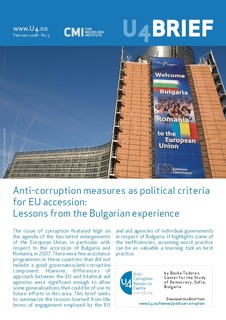| dc.contributor.author | Todorov, Boyko | |
| dc.date.accessioned | 2018-01-04T08:15:43Z | |
| dc.date.available | 2018-01-04T08:15:43Z | |
| dc.date.issued | 2008-02-20 | |
| dc.identifier | oai:www.cmi.no:2956 | |
| dc.identifier.citation | Bergen: Chr. Michelsen Institute (U4 Brief 2008:5) | |
| dc.identifier.uri | http://hdl.handle.net/11250/2474532 | |
| dc.description.abstract | The issue of corruption featured high on the agenda of the two latest enlargements of the European Union, in particular with respect to the accession of Bulgaria and Romania, in 2007. There were few assistance programmes in these countries that did not include a good governance/anti-corruption component. However, differences of approach between the EU and bilateral aid agencies were significant enough to allow some generalisations that could be of use to future efforts in this area. This brief seeks to summarize the lessons learned from the terms of engagement employed by the EU and aid agencies of individual governments in respect of Bulgaria. It highlights some of the inefficiencies, assuming worst practice can be as valuable a learning tool as best practice. | |
| dc.language.iso | eng | |
| dc.publisher | Chr. Michelsen Institute | |
| dc.relation | U4 Brief | |
| dc.relation | 2008:5 | |
| dc.relation.ispartof | U4 Brief | |
| dc.relation.ispartofseries | U4 Brief 2008:5 | |
| dc.relation.uri | https://www.cmi.no/publications/2956-anti-corruption-measures-as-political-criteria-for | |
| dc.subject | Anti-Corruption | |
| dc.subject | Corruption | |
| dc.subject | European Union | |
| dc.subject | Political Corruption | |
| dc.subject | Bulgaria | |
| dc.title | Anti-corruption Measures as Political Criteria for EU Accession: Lessons from the Bulgarian Experience | |
| dc.type | Report | |
